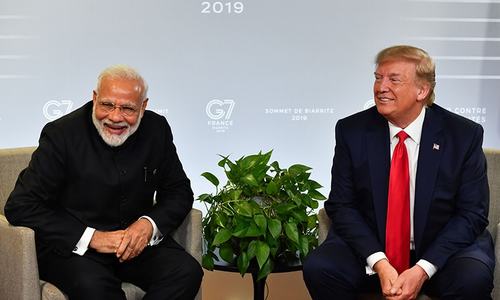Donald Trump and Narendra Modi both rose to power on nationalist appeals to their countries' majority communities.
Both scoff at traditional media and enjoy making pronouncements by Twitter. Now, the two leaders will bond over an extravaganza of Indian culture as they visibly symbolise their alliance.
The US president will join the Indian prime minister on Sunday at a football stadium in Houston where community representatives say they expect 50,000 Indian-Americans for performances followed by the leaders' remarks.
Dubbed, with a nod to Texan twang, "Howdy, Modi!", organisers describe the gathering as the largest-ever reception for a foreign leader in the United States other than the pope.
The event "shows the personal chemistry and friendship" between Modi and Trump and "sets a bold precedent which is unconventional and unique," said Harsh Vardhan Shringla, the Indian ambassador to the United States.
Modi, who cruised to a new mandate in elections this year, is fond of mass gatherings on his travels overseas as he seeks to demonstrate his appeal.
While no less fond of the limelight, Trump's presence is more unusual.
US presidents rarely join other countries' leaders before diaspora events, and Trump — with a hard line on immigration one of his signature issues — is hardly known for celebrating ethnic diversity.
But with US elections due in 14 months, Trump's presence may help soften his image in Houston, one of the most multiethnic US cities and ground zero in the rival Democratic Party's recent gains in the state of Texas, a must-win bastion of his Republican Party.
The four-million-strong Indian-American community also forms an enticing pool of voters. With an average household income of $100,000, Indian-Americans are among the most prosperous US groups.
They are also among the most solidly Democratic. Despite high-profile Indian-American Republicans such as Nikki Haley, Trump's first ambassador to the United Nations, more than 80 per cent voted in 2016 for Democrat Hillary Clinton — more than almost any other group other than African-Americans.
Organisers are trying to keep the event non-partisan and have also invited Steny Hoyer, the number-two Democrat in the House of Representatives.
Protests expected on Kashmir
The joint rally indicates that the two leaders have turned the page since July when the US leader startled India by saying in front of Prime Minister Imran Khan that Modi had sought mediation on Kashmir.
India has for decades rejected any outside role in Kashmir.
Last month, the Indian government repealed Article 370 of its constitution, stripping occupied Kashmir of its special status, and imposed a strict lockdown and communications blackout in the region that has snapped off ordinary people's internet and mobile telephone service across much of occupied Kashmir.
A Kashmiri-American group plans to protest outside of Houston's NRG Stadium against Modi, saying that India has violated basic human rights and cut off contact with relatives.
John Sifton, the Asia advocacy director of Human Rights Watch, said it was critical to raise concerns to Modi while he is abroad as, unlike previous Indian prime ministers, he has little back-and-forth interaction with the media.
"He is really in a kind of bubble in Delhi," Sifton said. "This is a moment for Modi to burst outside of his bubble and hear some criticism of what's happening in Kashmir."
Trump is set next week to meet more formally with Modi as well as with Prime Minister Imran.














































